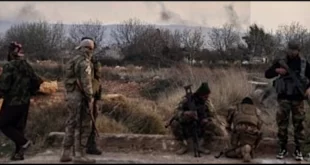
May 30, 2014, al Akhbar
The Turkish government recently cut off the flow of the Euphrates River, threatening primarily Syria but also Iraq with a major water crisis. Al-Akhbar found out that the water level in Lake Assad has dropped by about six meters, leaving millions of Syrians without drinking water.
Two weeks ago, the Turkish government once again intervened in the Syrian crisis. This time was different from anything it had attempted before and the repercussions of which may bring unprecedented catastrophes onto both Iraq and Syria.
Violating international norms, the Turkish government recently cut off the water supply of the Euphrates River completely. In fact, Ankara began to gradually reduce pumping Euphrates water about a month and half ago, then cut if off completely two weeks ago, according to information received by Al-Akhbar.
A source who spoke on the condition of anonymity revealed that water levels in the Lake Assad (a man-made water reservoir on the Euphrates) recently dropped by six meters from its normal levels (which means losing millions of cubic meters of water). The source warned that “a further drop of one additional meter would put the dam out of service.”
“We should cut off or reduce the water output of the dam, until the original problem regarding the blockage of the water supply is fixed,” the source explained.
The Islamic State in Iraq and Syria (ISIS) controlling the region the dam is located in did not suspend the water output. Employees of the General Institution of the Euphrates Dam are running the lake under the supervision of al-Qaeda linked ISIS, but they don’t have the authority to take serious decisions, such as reducing the water output. In addition, such a step is a mere attempt to ease the situation, and it will lose its efficacy if the water supply isn’t restored to the dam by Turkey.
The tragic repercussions of the new Turkish assault began to reveal themselves when water levels dropped in al-Khafsa in Aleppo’s eastern countryside (where a water pumping station from Lake Assad is located to pump water through water channels to Aleppo and its countryside).
Meanwhile, water supplies in auxiliary reservoirs in al-Khafsa are close to being depleted and the reservoirs are expected to run out of water completely by tonight or tomorrow morning at the latest. This threatens to leave seven million Syrians without access to water. Also, Tishrin Dam stopped receiving any water which blocked its electricity generating turbines, decreasing the power supply in Aleppo and its countryside, further intensifying the already severe imbalance in the power supply.
In Raqqa, the northern side of Lake Assad is today completely out of service. Two million Syrians living in the region covering the villages of Little Swaydiya to the east until al-Jarniya to the west could lose their drinking water supply. “Losing water supplies in the dam means that the silt in the lake will dry off which would pressure its structure, subjecting it to fissures and eventually total collapse,” Al-Akhbar sources warned, adding “it is crucial to shut down the dam to stop its collapse.”
However, shutting down the dam (if ISIS agrees) will only lead to a human and ecological (zoological and agricultural) catastrophe in Syria and in Iraq.
According to information obtained by Al-Akhbar, Aleppo locals (who had already launched many initiatives to reach solutions for a number of local issues) began a race against time to recommend solutions for the problem, including putting the thermal plant at al-Safira back to work, which may convince ISIS to spare the Euphrates Dam turbines, and in turn preserve current water levels in the lake.
In case it succeeds, such a step would only rescue whatever water and structures are left, and would ward off further repercussions of the crisis that has already started. A halt to the water supply is now inevitable and can’t be resolved unless the Turkish government takes the decision to resume pumping Euphrates water.
In any case, it is worth mentioning that the water in the lake would take about a month, after resuming pumping, to return to its normal levels.

Top: “The decrease in water levels” Bottom: “Euphrates Dam” (Photo: Al-Akhbar)
A historical conflict
The Euphrates River has historically been at the center of a conflict between Turkey on the one hand and both Syria and Iraq on the other. Ankara insists on considering the Euphrates a “trans-boundary river” and not an “international river,” hence it is “not subject to international laws.” Also, Turkey is one of the only three countries in the world (along with China and Burundi) that opposed the Convention on the Law of the Non-Navigational Uses of International Watercourses adopted by the General Assembly of the United Nations in 1997.
In 1987, a temporary agreement between Syria and Turkey was signed to share the water supplies of the Euphrates during the period when the basin of the Ataturk Dam was being filled. In virtue of the agreement, Turkey pledged to provide an annual level of over 500 cubic meters of water a second on the Turkish-Syrian borders, until reaching a final agreement about sharing the water supplies of the river between the three countries. In 1994, Syria registered the agreement at the United Nations to guarantee the minimum amount of Iraq and Syria’s right to the water from the Euphrates River.
 Syria Support Movement solidarity with the Syrian people
Syria Support Movement solidarity with the Syrian people




